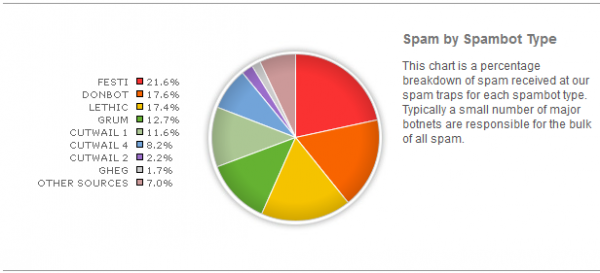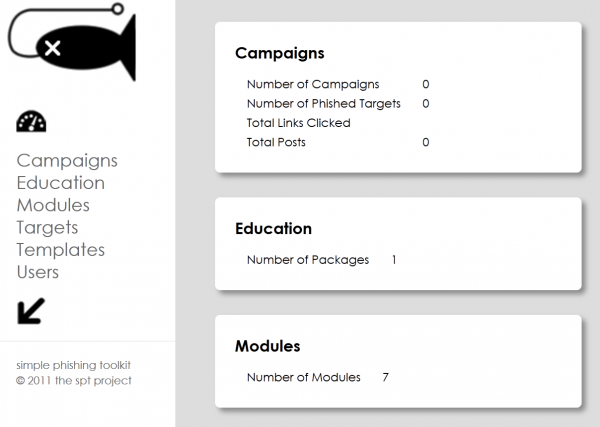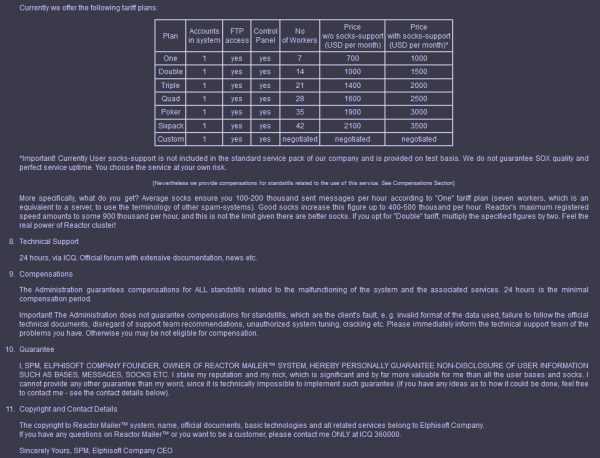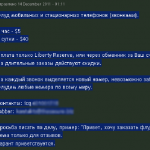Previous stories in my Pharma Wars series have identified top kingpins behind the some of the biggest spam botnets. Today’s post does that and more, including never-before-published information on “Google,” the lead hacker behind the world’s busiest spam botnet — Cutwail.

December 2011 spam stats from M86Security
For many years, Cutwail has been among the top three most prolific spam botnets. With the recent takedown of the Rustock botnet, Cutwail now is the top spam bot; according to M86 Security, versions of Cutwail are responsible for about 22 percent of the daily spam volumes worldwide.
Security researchers have extensively dissected the technical machinery that powers Cutwail (a.k.a. “Pushdo” and “Pandex”), but until now little has been published about the brains behind it. Krebs On Security has learned that the individual principally responsible for developing and renting this crime machine to other miscreants was a top moneymaker for SpamIt, until recently the world’s largest rogue Internet pharmacy affiliate program.
By the time he joined SpamIt in early 2007, the hacker named Google had already spent several years fine-tuning his spam botnet. Just months prior to its closure in Oct. 2010, SpamIt was hacked, and its customer and affiliate data leaked online. The data shows that Google used close to a dozen affiliate accounts at SpamIt, and made nearly $175,000 in commissions advertising SpamIt’s rogue online pharmacies with the help of Cutwail.
But Google would make far more money renting his botnet to other spammers, and SpamIt affiliates quickly became his biggest client base. Interestingly, the proprietors of SpamIt initially asked for Google’s help not to spam rogue pharmacies, but to jump-start a new affiliate program called Warezcash to sell “OEM” software — mostly pirated copies of Microsoft Windows and other high-priced software titles.
That relationship is evident from hundreds of chat logs between Google and SpamIt co-founder Dmitry “Saintd” Stupin. The conversations were part of thousands of hours of logs obtained by Russian cybercrime investigators who examined Stupin’s computer. The chats were later leaked online, and provide a rare glimpse into the day-to-day operations of Cutwail from the botmaster’s perspective. They also provide tantalizing clues as to the real-life identity of Google and his co-workers. Snippets of those conversations appear below, translated from their original Russian into English by native Russian speakers.
THE CUTWAIL MACHINE
Some of the best techical analysis of Cutwail came earlier this year in a paper from researchers at the University of California, Santa Barbara and Ruhr-University Bochum, which described in detail how the Cutwail botnet was operated, rented and promoted on the exclusive SpamIt forums. From their paper (PDF):
“The Cutwail spam engine is known in spam forums by the name 0bulk Psyche Evolution, where it is rented to a community of spam affiliates. These affiliates pay a fee to Cutwail botmasters in order to use their botnet infrastructure. In return, the clients are provided with access to a Web interface (available in Russian or English language) that simplifies the process of creating and managing spam campaigns…”
SpamIt affiliate records show that Google registered with the program using the email address psyche.evolution@gmail.com (according to historical WHOIS records, the domain name psyche-evolution.com was registered in 2005 by that same email address, to an organizations called “0bulk corp.” in Moscow).
In several chats with Stupin, Google describes how he and his pals switched to pharmacy spamming when promoting stocks via spam became less lucrative. In a discussion on Feb. 25, 2007, Google said he was “renting software for spam,” to competing spam affiliate programs “Mailien,” “Bulker,” and “Aff Connection,” and that all of his clients had great success converting traffic into sales. “We have been spamming stocks, however now stocks started converting badly, so we decided to spam in parallel with some affiliate programs. We organized people, gave them tasks to do. We’ve been spamming them for a week only, but I think we’ll do good.”
Continue reading →














